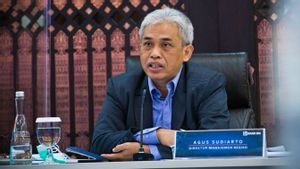JAKARTA - Member of the Board of Commissioners of the Deposit Insurance Corporation (LPS) Didik Madiyono revealed, entering the end of 2022, domestic recovery will continue amid the high factor of external uncertainty.
According to him, Indonesia's economic resilience is supported by domestic consumption and investment that is growing well, where large domestic consumption causes shocks that occur at the global level to be suppressed by solid domestic economy.
"The national economy has strong fundamentals because it is dominated by boosts in domestic consumption," he said at the Seminar The 6th Indonesia Risk Management Outlook 2023 quoted Thursday, November 17.
In addition, he continued, the banking industry is also in a stable condition with a strong level of capital, an adequate level of liquidity, and adequate profitability growth.
Based on the latest data, despite global uncertainty, the Indonesian economy was able to grow, especially among other G20 member countries, which was 5.72 percent in the third quarter, after previously growing 5.45 percent in the second quarter.
Didik explained that the resilience of the banking industry was well maintained. The banking capital level is very thick at the level of 25.12 percent in September 2022.
Meanwhile, lending grew by 11.00 percent yoy with third party funds starting to normalize by growing 6.77 percent YoY in September 2022.
"This indicates that banking intermediation continues to increase with controlled credit risk. Bank liquidity is still very adequate to encourage future credit growth with indications of Liquid/Non-Core Deposit/AL/NCD equipment which is 121.61 percent or twice higher than the 50 percent threshold," he explained.
Furthermore, Didik emphasized that the KSSK member institutions, namely, BI, OJK, LPS and the Ministry of Finance will continue to carry out intense synergy and coordination in order to maintain the stability of the Financial System (SSK) to deal with the increasing global risk potential.
"LPS together with other KSSK members synergize to overcome the shock impact on the economy. When there is a disturbance or shock in the economic system, the government's shock absorber mechanism is generally carried out through fiscal policy and by the central bank with monetary policy, this is intended to strengthen national macroeconomic fundamentals to survive shocks and shocks in the economic system," he concluded.
The English, Chinese, Japanese, Arabic, and French versions are automatically generated by the AI. So there may still be inaccuracies in translating, please always see Indonesian as our main language. (system supported by DigitalSiber.id)













